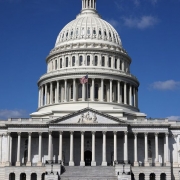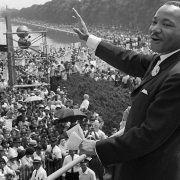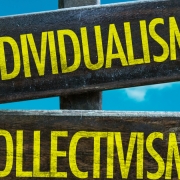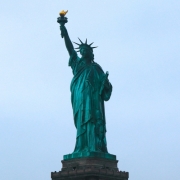Pop quiz: what’s the most economically significant difference between the style of your underwear and the cabin temperature of a 747 jet en route from New York to Paris?
The answer is that the style of your underwear is highly individual in a way that the 747’s cabin temperature is not. You can wear whatever style of panties, briefs, or boxers you like without obliging anyone else to wear that same style. On any NY-to-Paris flight there might be 400 people without any 2 of them wearing exactly the same style, color, and size of underwear.
Not so with the 747’s cabin temperature. At any point in time, the thermostat on that jet can be set on only one temperature — a temperature that must be lived with by everyone on board. Unlike with underwear, I cannot “wear” the 69-degree temperature that I prefer while the person in the seat next to mine “wears” the 73-degree temperature that is ideal for her.
Deciding on Collective Goods
Economists call the cabin temperature in the jetliner a “collective good” — to be distinguished from a “private good” such as underwear. Roughly speaking, one central feature of a collective good is that, if it is supplied, it is supplied in a lump sum to a large collection of people. Its provision cannot, at reasonable cost, be individualized. Therefore, deciding on the provision of a collective good — whether to provide it at all and, if so, in what particular form — poses challenges that are absent for the provision of underwear and other private goods.
Because individual passengers cannot each have his or her ideal temperature, there is required some process for selecting the temperature for the group. One possible process is randomness: keep the thermostat set at whatever temperature it happens to be set on. But randomness is unappealing. If the setting happens to be at 82 degrees, most people will be uncomfortably warm. Surely it’s desirable to exercise some human decision-making to choose the setting.
Let’s imagine that this 747 is owned and operated by Democracy Air, which, as part of its marketing, boasts that it lets all passengers on each flight choose the cabin temperature setting through a majority-rule voting procedure. (Obviously, on real-world jetliners the cabin-temperature setting is chosen by the captain. It’s not unreasonable to suppose that this method is used because the chances of the captain choosing a disagreeable temperature are so small that the benefits of turning the choice over to a majority of passengers aren’t worth the costs of conducting such an election.)
Although it’s impossible to devise any method of voting that produces outcomes that reflect only the preferences of the voters (and not also some arbitrary feature of the voting method itself), majority rule in this case is nevertheless a reasonable method for choosing the thermostat setting. Everyone who votes on a temperature setting has a say. And because human beings do not have wildly different preferences for ambient air temperature, the winning temperature in this election will almost surely be one that is acceptable to — if not ideal for — everyone.
Yet regardless of the “correctness” or “incorrectness” of the democratically chosen thermostat setting, the fact remains that all passengers on the plane must live with whatever setting is chosen — a reality, of course, that is true regardless of the method for choosing the thermostat setting.
Deciding on Individual Goods
But now suppose that a genius engineer at Boeing invents an air-conditioning system that allows each passenger for the entire flight, at no extra cost, to have his or her ideal temperature. Jones in seat 31A enjoys his 76-degree environment while Smith in seat 31B is comfortable in the 69-degree air surrounding her. What effect would this invention have on Democracy Air’s boast that the cabin temperature on each of its flights is determined by majority-rule voting of the passengers? Answer: that boast would lose all marketing appeal.
When only one cabin temperature is possible, many airline passengers might value Democracy Air’s majority-rule system. Yet with individual temperatures now available, there is no reason to submit cabin temperature to a collective decision.
Democracy, in other words, is valuable only for making decisions that are truly collective — that is, for choosing outcomes that many people must simultaneously live with. Real-world examples include, nationally, the size of Uncle Sam’s defense budget, and, more locally, the level of pollution abatement for Lake Pontchartrain.
For these and other collective choices, it’s justifiable to support democracy over other means of choosing, such as dictatorship or coin flipping. But any enthusiasm for democracy born from the desire to have genuinely collective choices made by voters rather than by monarchs, autocrats, or random chance should not metastasize into the blanket superstition that democracy is the best means of making any and all decisions.
When decisions can be individualized at reasonable cost, the appropriate decision-maker in each case is the individual who is most affected by the choice. Just because democracy is the best way to decide on the appropriate level of pollution abatement for Lake Pontchartrain does not mean that democracy is the best way to decide which style of undergarments we all wear.
A Serious Point
Because no serious person wishes to subject our choices in underwear to majority rule, my narrative above might seem pointless. Yet the point becomes clear by surveying modern governments’ vast range of activities. Surprisingly few of these activities involve the provision of genuine collective goods. The great bulk of them involve the state overriding choices that each individual could and would make privately — that is, that each individual could and would make without obliging other people to consume the same good or service that the individual decision-maker chooses.
In the United States today, government superintends individual decisions to purchase imports; it prevents individuals from voluntarily choosing to patronize hair-braiders, dentists, and physicians who have no state-issued licenses; it compels each worker to save some minimum amount for retirement; it specifies many of the detailed terms on which we may and may not participate in financial markets; it dictates the maximum rate at which water may flow from our household faucets. Although each of these — and countless other — officious interventions is sold as somehow furthering the collective good, in fact each such intervention substitutes the state’s choices for the choices that individuals could make on their own without imposing their preferences on others.
In the face of this egregious officiousness, too many people remain nonchalant. Because the American government is democratically elected, there’s a widespread presumption that the actions of this government are, as a rule, the best ones possible. Yet this presumption is mistaken. It is the product of the metastasizing of a correct understanding — namely, that democracy is a sound means of making collective choices — into the lethal fiction that democracy is ethically and epistemologically superior to individual decision-making in nearly all situations.
Donald J. Boudreaux is a senior fellow with American Institute for Economic Research and a professor of economics and former economics-department chair at George Mason University.










